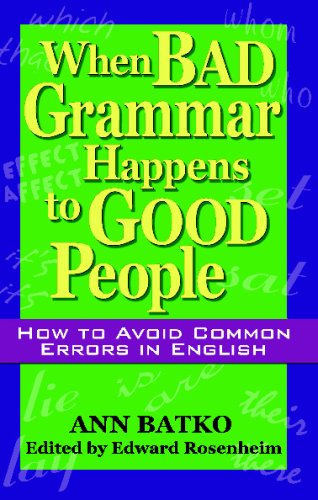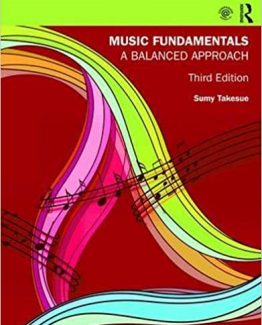When Bad Grammar Happens to Good People by Ann Batko, ISBN-13: 978-1564147226
[PDF eBook eTextbook]
- Publisher: Weiser; First Edition (May 15, 2004)
- Language: English
- 256 pages
- ISBN-10: 1564147223
- ISBN-13: 978-1564147226
Ever stumble when choosing between who and whom, affect and effect, “lay” and “lie”?
Are you worried that how you speak or write is holding you back at work? Do you fear you’re making frequent conversational errors, but just aren’t sure what’s correct? How you use language tells people a good deal about who you are, how you think, and how you communicate. Making simple errors in written and spoken English can make you seem less sophisticated, even less intelligent, than you really are. And that can affect (not effect) your relationships, your friendships, and even your career.
This comprehensive, easy-to-use reference is a program designed to help you identify and correct the most common errors in written and spoken English.
After a short and simple review of some basic principles, When Bad Grammar Happens to Good People is organized in the most useful way possible–by error type, such as Problem Pronouns or Mixing up Words that Sound the Same. You choose how to work your way through, either sequentially or in the order most relevant to you. Each unit contains tests at the end to help you reinforce what you’ve learned. Best of all, the information is presented in a clear, lively, and conversational style–this is not your eighth-grade grammar textbook!
Table of Contents:
Title Page
Copyright Page
Table of Contents
Dedication
Acknowledgements
Author’s Note
Foreword
How Do We Learn to Speak Correctly?
Pretest
Grammar Review
CHAPTER 1 – Perplexing Pronouns
A Lesson on Pronoun Cases
Subjective and Objective Cases
Objective and Possessive Cases
Relative Pronouns: “Which,” “That,” and “Who/Whom”
Intensive or Reflexive Pronouns—What There for and Where NOT to Put Them
CHAPTER 2 – Vexing Verbs
Transitive and Intransitive Verbs
A Lesson on Verb Tenses
Tricky Verb Tenses
The Subjunctive Mood
CHAPTER 3 – Ambiguous Agreements
Agreement With Compound Subjects
Agreement With Indefinite Pronouns
Indefinite Pronouns and Personal Pronouns
CHAPTER 4 – Mangled Modifiers
Adjectives vs. Adverbs
Comparatives vs. Superlatives
Distance/Number/Quantity Modifiers
Absolute Modifiers
Imprecise and Made-up Modifiers
CHAPTER 5 – Problem Prepositions
Prepositions Expressing Fine Shades of Meaning
Unidiomatic and Superfluous Prepositions
CHAPTER 6 – Confused Connections
Boolcend Expressions
Imprecise, Pretentious, or Needless Connectors
CHAPTER 7 – Puzzling Plurals
76. Media
77.Data
78. Alumni
79. Criteria
80. Phenomena
81. Memoranda
CHAPTER 8 – Mixing up Words That Sound the Same
82. Accept vs. Except
83. Advice vs. Advise
84. Affect vs. Effect
85. Amoral vs. Immoral
86. Averse vs. Adverse
87. Beside vs. Besides
88. Biannually vs. Biennially
89. Climatic vs. Climactic
90. Could of vs. Could have
91. Elude vs. Allude
92. Imminent vs. Eminent
93. Ingenious vs. Ingenuous
94. Jibe vs. Jive
95. Tack vs. Tact
96. Tortuous vs. Torturous
CHAPTER 9 – Mixing up Words That Look the Same
97. Adapt vs. Adopt
98. Allusion vs. Illusion vs. Delusion
99. Assignment vs. Assignation
100. Childlike vs. Childish
101. Continual vs. Continuous
102. Creditable vs. Credible vs. Credulous
103. Incredible vs. Incredulous
104. Elegy vs. Eulogy
105. Epitaph vs. Epithet
106. Flaunt vs. Flout
107. Luxurious vs. Luxuriant
108. Morale vs. Moral
109. Periodic vs. Periodical
110. Persecute vs. Prosecute
111. Proceed vs. Precede
112. Respectful vs. Respective
113. Sensuous vs. Sensual
114. Simple vs. Simplistic
115. Uninterested vs. Disinterested
CHAPTER 10 – Mixing up Words Whose Meanings Are Related
116. Annoy vs. Irritate vs. Aggravate
117. Burglary vs. Robbery
118. Can vs. May
119. Compose vs. Comprise
120. Convince vs. Persuade
121. Eager vs. Anxious
122. Explicit vs. Implicit
123. Figuratively vs. Literally vs. Virtually
124. Imply vs. Infer
125. Kind of/Sort of vs. Rather
126. Let vs. Leave
127. Like vs. As/As If
128. Likely vs. Apt vs. Liable
129. Percent vs. Percentage
130. Quote vs. Quotation
131. Semiannually vs. Semimonthly vs. Semiweekly
132. Serve vs. Service
133. Take vs. Bring
134. Use vs. Utilize
Chapter 11 – Made-up Words
135. Irregardless
136. Authored
137. Critiqued
138. Gift
139. Adding “-ize”
140. Enthuse
141. Adding “-wise”
CHAPTER 12 – Wasteful Words and Infelicities
142. A half a
143. And et cetera
144. Like
145. The field of
146. Needless to say
147. Time period
148. Party
CHAPTER 13 – Mispronounced Words
149. Air vs. Err
150. Anyways vs. Anyway
151. A ways vs. A way
152. Cent vs. Cents
153. Libary vs. Library
154. Reconize vs. Recognize
155. Stricly vs. Strictly
156. Heighth vs. Height
157. Athaletics vs. Athletics
158. Goverment vs. Government
159. Irrevelant vs. Irrelevant
160. Temperment vs. Temperament
161. Lightening vs. Lightning
162. Mischevious vs. Mischievous
163. Grevious vs. Grievous
164. Histry vs. History
165. Nucular vs. Nuclear
166. Perscription vs. Prescription
167. Prespiration vs. Perspiration
168. Disasterous vs. Disastrous
169. Accidently vs. Accidentally
170. Representive vs. Representative
171. Preform vs. Perform
172. Asterik vs. Asterisk
173. Artic vs. Arctic
174. Anartica vs. Antarctica
175. Expresso vs. Espresso
Review Tests
About the Author and Editor
Ann Batko is a business communications expert and former executive editor of Rand McNally & Company. She has trained numerous advertising, marketing, and publishing executives how to be effective writers and presenters.
Edward Rosenheim is the David B. and Clara E. Stern Professor Emeritus, in the Department of English Language and Literature at the University of Chicago, where he taught for 42 years. For 20 years, he was the editor of the prestigious journal Modern Philology.
What makes us different?
• Instant Download
• Always Competitive Pricing
• 100% Privacy
• FREE Sample Available
• 24-7 LIVE Customer Support





